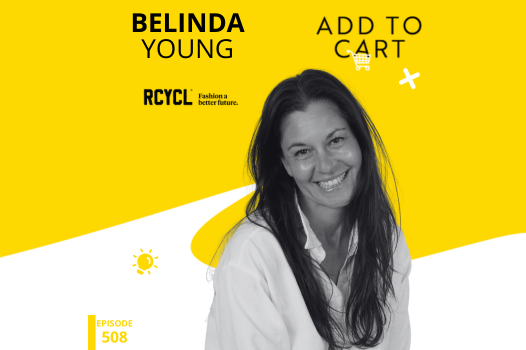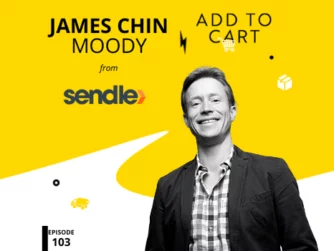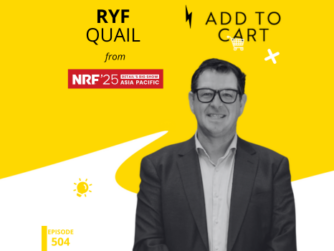Ever found yourself staring at a bag of old clothes you intend to donate in your hallway or car boot for months? RCYCL is built for you. But more importantly, it’s built for retailers. Belinda Paul, founder of RCYCL, is no stranger to the world of fashion and retail.
With a deep background in product development, manufacturing and brand management, she’s worked across high-volume fashion, international brands, and now, she’s on a mission to reshape the lifecycle of garments. RCYCL is already making waves with major retailers like THE ICONIC and Myer, earning full visual merchandising activations and even support from THE ICONIC’s CEO. It’s one of the smartest sustainability integrations in ecommerce today—and it’s built like a true retail product.
Solving the wardrobe pile-up
The 2019–2020 bushfires were a wake-up call for Belinda, a visceral reminder of the climate crisis. Feeling overwhelmed, she asked herself: “What can I do with the skills I already have to make a difference?” With a background in retail, a product mindset and a sustainability mission, she designed RCYCL to slot seamlessly into the online shopping experience to encourage circular fashion.
“On average, people have garbage bags of clothes in their boot for three to six months before they actually donate them,” Belinda shared. It’s not that people don’t want to do the right thing, it’s just that life gets in the way. RCYCL solves this by including a recycling bag or donation bag in the parcel when customers receive a new item. With everything they need — bag, instructions and a QR code for easy drop-off.
We’re thinking about making recycling and donating as intuitive as buying new clothes….When you get something in, why don’t we get something out and cleanse and feel good about it?
Putting something like this into a customers’ hands at the moment they receive something new encourages a natural behavioural trigger: out with the old, in with the new. It’s a perfect example of why you need to explore what’s really going on post-purchase. Can you remove emotional friction, like guilt or indecision, and turn it into an opportunity to add value and loyalty?
Make sustainability a sellable SKU
When Belinda set out to create RCYCL, she didn’t just want to build a sustainability initiative—she wanted to create a product that could move through a retail business like any other SKU. That meant thinking commercially from day one.
I wanted to create a system and product that went to the sustainability manager and they’d say, ‘Yeah, I love it’—but also to the CFO, and they’d say, ‘It’s not costing us anything. In fact, we’re making a small revenue from it.
RCYCL is treated just like any other inventory item. It has a barcode. It’s bought wholesale by the retailer, sold at RRP and tracked like a standard product. It’s this positioning that got RCYCL listed and activated by national retailers like Myer, who gave RCYCL full branded floor displays and in-store merchandising, and THE ICONIC, whose CEO personally launched the partnership to the media.
“This is a problem everyone faces. We all just don’t know what to do about it. And I just said, ‘Give us a go. This is a problem everyone faces—we just don’t know what to do about it.”
The lesson? Sustainability doesn’t have to live in your brand values section or CSR report. It can live right in your product catalogue. When you make sustainability operationally simple and commercially viable, adoption becomes much easier—internally and for customers. In other words, when sustainability makes financial sense, it scales.
Convenience always wins
Belinda’s next move is all about expanding RCYCL’s offering from recycling and donation to repair, a move that puts customer convenience front and centre.
We also have a pile of clothes that needs a hem or a zip or a button… so we’ve partnered with an amazing business called Hello Tailr… we’re launching this to market in the next week.
Here’s how it works: customers purchase a repair bag for $19.95, which covers the cost of return shipping. Once received, they scan a QR code, log the type of repair needed, and send their garments off to one of RCYCL’s partnered social enterprise repair centres. The item is fixed and returned to their doorstep. No need to visit a tailor. No excuses.
The model makes use of RCYCL’s logistics partnerships and Hello Tailr’s back-end tech platform to make the process feel seamless to the end customer. For Belinda, it’s about removing the effort barrier.
“If I had a garment sitting in my wardrobe for six months that I hadn’t worn because it needed a repair, I’d probably just go buy something new. But if I can get it fixed from home? That’s the difference.”
If you’re looking to build loyalty and reduce churn, convenience often beats price. Consider how you can create value not just at checkout, but after purchase, through services, experiences or long-tail customer support.
Making sustainability shoppable
Belinda’s success with RCYCL proves that sustainability is so much more than a brand’s values page. It can be a revenue driver, a customer experience differentiator and a genuine loyalty trigger. But only if it’s easy, accessible and built to work inside the existing ecommerce model. If you’re trying to differentiate and make a difference your next big win might not be a new product, channel or feature, it might be solving a small, shared pain point in a big, scalable way. And if you can design for both impact and convenience? You’re halfway there.
Want more insights? Listen to the full episode with Belinda Paul here.






